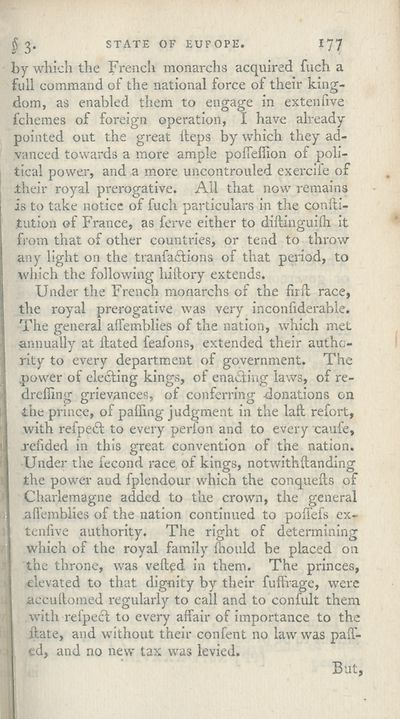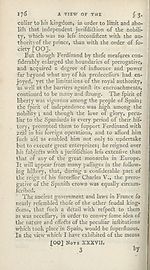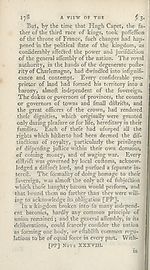Download files
Complete book:
Individual page:
Thumbnail gallery: Grid view | List view

g 3- STATE OF EUFOPE. 177
by which the French monarchs acquired fuch a
full command of the national force of their king¬
dom, as enabled them to engage in extenfive
fchemes of foreign operation, I have already
pointed out the great iteps by which they ad¬
vanced towards a more ample pofTeffion of poli¬
tical power, and a more uncontrouled exercife of
their royal prerogative. All that now remains
is to take notice of fuch particulars in the confti-
tution of France, as ferve either to diftinguilh it
from that of other countries, or tend to throw
any light on the tranfaftions of that period, to
which the following luftory extends.
Under the French monarchs of the firft race,
the royal prerogative was very inconfiderable.
The general affemblies of the nation, which met
annually at Hated feafons, extended their autho¬
rity to every department of government. The
power of electing kings, of ena£ting laws, of re-
drefilng grievances, of conferring donations on
the prince, of palling judgment in the lalt refort,
with refpeft to every perfon and to every caufe,
i refided in this great convention of the nation.
Under the fecond race of kings, notwithftanding
the power aud fplendour which the conquefts of
Charlemagne added to the crown, the general
ahemblies of the nation continued to poffefs ex¬
tenfive authority. The right of determining
which of the royal family Ihould be placed on
the throne, was veiled in them. The princes,
elevated to that dignity by their fuffrage, were
accuttomed regularly to call and to confult them
with relpecl to every affair of importance to the
Hate, and without their confent no law was paff-
itj ed, and no new tax was levied.
But,
by which the French monarchs acquired fuch a
full command of the national force of their king¬
dom, as enabled them to engage in extenfive
fchemes of foreign operation, I have already
pointed out the great iteps by which they ad¬
vanced towards a more ample pofTeffion of poli¬
tical power, and a more uncontrouled exercife of
their royal prerogative. All that now remains
is to take notice of fuch particulars in the confti-
tution of France, as ferve either to diftinguilh it
from that of other countries, or tend to throw
any light on the tranfaftions of that period, to
which the following luftory extends.
Under the French monarchs of the firft race,
the royal prerogative was very inconfiderable.
The general affemblies of the nation, which met
annually at Hated feafons, extended their autho¬
rity to every department of government. The
power of electing kings, of ena£ting laws, of re-
drefilng grievances, of conferring donations on
the prince, of palling judgment in the lalt refort,
with refpeft to every perfon and to every caufe,
i refided in this great convention of the nation.
Under the fecond race of kings, notwithftanding
the power aud fplendour which the conquefts of
Charlemagne added to the crown, the general
ahemblies of the nation continued to poffefs ex¬
tenfive authority. The right of determining
which of the royal family Ihould be placed on
the throne, was veiled in them. The princes,
elevated to that dignity by their fuffrage, were
accuttomed regularly to call and to confult them
with relpecl to every affair of importance to the
Hate, and without their confent no law was paff-
itj ed, and no new tax was levied.
But,
Set display mode to:
![]() Universal Viewer |
Universal Viewer | ![]() Mirador |
Large image | Transcription
Mirador |
Large image | Transcription
| Antiquarian books of Scotland > Kings & rulers > History of the reign of the Emperor Charles V. > Volume 1 > (195) |
|---|
| Permanent URL | https://digital.nls.uk/109184671 |
|---|
| Description | By William Robertson. London : Cadell and Davies, 1798. |
|---|---|
| Shelfmark | ABS.1.76.13 |
| Additional NLS resources: | |
| Description | Thousands of printed books from the Antiquarian Books of Scotland collection which dates from 1641 to the 1980s. The collection consists of 14,800 books which were published in Scotland or have a Scottish connection, e.g. through the author, printer or owner. Subjects covered include sport, education, diseases, adventure, occupations, Jacobites, politics and religion. Among the 29 languages represented are English, Gaelic, Italian, French, Russian and Swedish. |
|---|

